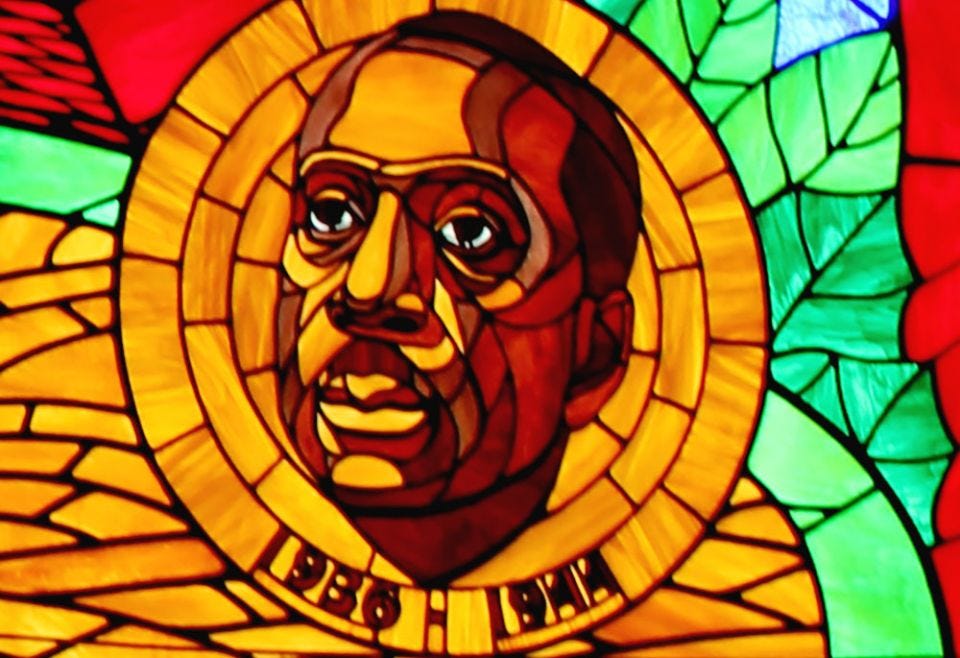The Suffering Sermon: Some Final Questions
Augustine and Howard Thurman on Suffering Injustice and the Kingdom's Righteousness Made Visible
This is the final installment of a brief series, bringing together Augustine and Howard Thurman on the Sermon on the Mount, particularly on how we bear witness to the Kingdom of Heaven, and what virtue and violence have to do with it.
The Witness to Righteousness, But At What Cost?
Thus far, one of the things which has emerged from reading these two surprisingly similar commentators together is their common conviction that 1) suffering for the sake of righteousness is the apex of the spiritual life, 2) that this suffering is done for the sake of the unjust, and 3) for this suffering to occur, one must first be engaged in a life of virtue. This isn’t heroism that they’re calling for so much as virtue: if we’ve been living lives of ease, the chances of us being able to do the Hard Thing when required is less than likely. Heroism—jumping over the chasm between the ordinary and the extraordinary—is possible, but virtue is the stuff of slow formation.
Their focus on this suffering for the sake of the unjust runs very counter to the question that comes up with my students who read these passages. In Bible study last week, we read 1 Peter 2:11-15, which covers surprisingly similar ground to the articulations of Thurman and Augustine:
Dear friends, I urge you, as foreigners and exiles, to abstain from sinful desires, which wage war against your soul. Live such good lives among the pagans that, though they accuse you of doing wrong, they may see your good deeds and glorify God on the day he visits us. Submit yourselves for the Lord’s sake to every human authority: whether to the emperor, as the supreme authority, or to governors, who are sent by him to punish those who do wrong and to commend those who do right. For it is God’s will that by doing good you should silence the ignorant talk of foolish people.
What I would have missed before reading Augustine is that these first two verses are not two separate commands, but two parts of the same command: to “abstain from sinful desires” is that which, by the lights of the Beatitudes, sets the stage for a person to be able to “live good lives among the pagans”.
But the question came up immediately: what about those who are suffering that are not yourself? The assumption in asking this question is that we ourselves are not in suffering, and so this verse is addressed to another, the ones in suffering. Is the approach of Augustine and Thurman, while commendable and loving toward the unjust, baking in suffering as a necessity, and at some level, necessity for those who have no other option than to keep suffering the injustice?
The Surd of Unjust Suffering
In my biomedical ethics course, one of the aspects which surfaced this morning was the relative unease my students have with the prospect of unproductive suffering: if a patient undergoes pain toward the end of recovery, it’s justifiable, but not if there’s no certainty that the pain will have a positive medical outcome on the other end. As pre-medical professionals, they’re worried not only about legal aspects, but about futility of care, and so, it’s understandable that they want the pain to do something.
But the truth is this: suffering may not work. It may not effect anything. This is the criticism which has been made of nonviolent bearing of injustice: it assumes there’s a conscience to be moved, but what if the conscience of the unjust is dead? What if they can’t be moved? And again, it’s one thing for me to bear that kind of suffering, and another for me to commend someone else to do it.
What escapes our frame, which would have been apparent to both Matthew and to Peter, is two things here:
The suffering commended is a suffering shared. It’s a suffering that Matthew and Peter both knew well, and which they actively participated in. That the ones suffering are of the same body as the ones not being targeted by the injustice calls for an obligation1 by the whole of the body to bear with that suffering, to honor that sacrifice visibly and clearly, to join in that suffering, and to help bear the weakness. What's more, as Augustine points out, this suffering is one shared not just by the body of Christ, but by the head as well.
But perhaps that’s just solidarity that produces a moral victory? Hooray: now all of us suffer, without any active resistance to the cause of the suffering? This is where Augustine and Thurman’s vision takes an interesting, and perhaps radical turn:
The only way out of unjust suffering is by conversion of the unjust. To produce a policy which ends the injustice ends suffering in the short run, and in a very specific form. And there is some value to this. But both of them have a longer view, I think, both with respect to what is ultimately at stake in unjust suffering (that we bear witness to the Kingdom and its righteousness), and with respect to how injustice works. Because the unjust produce unjust legislation and advocate for unjust policy, the way forward is the conversion of the unjust, that they would join with the ones they oppressed, in repentance and as one body.
The Problem of Making The Sermon on the Mount Too Practical
In other words, the way forward is ultimately conversion, that the unjust become just, and that they join in the life of virtue. That suffering exists in the world, and that it exists as an uneven burden, even among the body of Christ, is not resolvable by policy alone.
But arguably, this is where readings of the Sermon on the Mount have been lodged for decades now. The direct culprits are those like the late Glen Stassen who wrote about the teachings of the Sermon as “transformative initiatives”, invitations to practice the world differently. Other well-meaning pacifists have looked at the “moral jujitsu” of the Sermon to make the argument that the nonviolence of the Sermon “works”, and can be made an institutional program.
The solution to this is not to make the Sermon impractical or unrealistic, but to say that what the Sermon is about is the union of the heavens and earth as a form of prayer, a slow growth like a mustard seed, a rapacious and hidden revolt against Death which breaks forth in unexpected ways. The Sermon will not be tamed, even if it does lay claim to how institutions work (like our worship at the altar, reconciliation, marriage, court process, etc.). The key here, as Augustine and Thurman show us, is that the Beatitudes are borne witness to in the most paradoxical of ways: embodying God’s righteousness in suffering and doing it anyway.
Reading: Finishing up The Brothers K in anticipation of our book club meeting. This was the choice of one of our members who’s month at the end of the month, and will be sorely missed. What We Owe The Future continues to be what I suspected: a proposal for a moral future in which we simply offload the work of arguing about morals to AI algorithims, and trust that nothing breaks. Starting in on Anne Carpenter’s Nothing Gained is Eternal, on what theological traditions are.
There it is. I knew we couldn’t get away from talking about obligations again.





